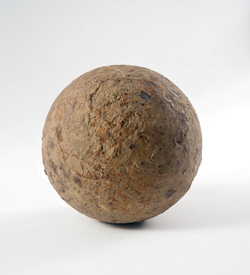Baldwin’s account in his diary, as transcribed in this copy with line breaks for easier reading, continues:
we came to Tanner Brooks at Lincoln Bridge & then we concluded to scatter & make use of the trees & walls for to defend us & attack them—We did so & pursued on flanking them—(Mr Daniel Thompson was killed & others[)]. till we came to Lexington. I had several good shots—“Tanner Brooks” referred to the tannery owned by the Brooks family. Analysts of the battle say the Woburn companies engaged the British troops somewhere around the Hartwell Tavern within the borders of Lincoln.
The Enemy marched very fast & left many dead & wounded and a few tired I proceeded on till coming between the meeting house and Mr Buckmans Tavern with a Prisoner before me when the Cannon begun to play the Balls flew near me I judged not more than 2 yards off.The picture above, courtesy of the Massachusetts Historical Society, shows a “small cannon ball, said to have been found on the side of the road near Lexington” at some point. The webpage for this artifact says: “It is made of lead and was the type of projectile fired from a smooth-bored cannon.”
I immediately retreated back behind the Meeting house and had not been there 10 seconds before a ball came thru the Meeting house near my head.
I retreated back towards the meadow North of the Meeting house & lay & heard the ball in the air & saw them strike the ground I judged about 15 or 20 was fired but not one man killed with them. They were fired from the crook in the road by Easterbrooks—
In The Road to Concord I argue that the presence of cannon in Concord, and particularly the brass cannon of the Boston militia train, was crucial to Gen. Thomas Gage’s decision to order an expedition there.
But the provincials moved most of those cannon further west in the days before that march. They probably weren’t all equipped for use, anyway. On the British side, the expedition under Lt. Col. Francis Smith marched with no artillery for maximum speed.
But Col. Percy’s reinforcement column did come out with field-pieces, and those were the cannon that Loammi Baldwin and his Woburnites ran into. By deploying heavy weapons for the first time that day, Percy was able to make time for the combined British forces to regroup in Lexington, tend their wounded, and set off for Boston.
As for Maj. Baldwin, his diary stops as quoted above. The transcripts don’t resume until May, when he was an officer in the provincial army. Baldwin probably decided that having marched into Concord and back, fired “several good shots,” and taken a prisoner, his unit had done their dangerous duty for the day. He and his men may have followed the British column east for some more miles, but they stayed out of cannon range.

No comments:
Post a Comment